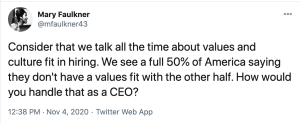We are in the middle of Crazy Town, and apparently no one has a map. Covid is at record-high levels across the United States, and there doesn’t seem to be a plan to handle that. The world of business changes daily, with economic uncertainty in the driver’s seat. And on top of all of that, we’ve got one of the most emotionally-charged presidential elections in modern history…and that’s saying something.
It was that last bit (the election) that prompted me to tweet the following:
 Now, I’m on the record that I don’t think culture fit is a good metric for selection. However, once you have hired a person, culture and values play an important role in how employees experience their work. Add into that the fact that there will be clashes among your people, and you can see that your business needs to figure this whole thing out.
Now, I’m on the record that I don’t think culture fit is a good metric for selection. However, once you have hired a person, culture and values play an important role in how employees experience their work. Add into that the fact that there will be clashes among your people, and you can see that your business needs to figure this whole thing out.
When you consider all the factors, the most pressing element that stands out is the need for empathy. This is important in all walks of life, but given how this is an article about recruiting strategy, I want to focus on empathy in your hiring process.
Elevating Empathy
With record layoffs since the beginning of the pandemic, there are a lot of worried people who are looking for work. Many of them have little to no savings, or they had savings that are now depleted. Plenty of them have seen their industry completely shut down and are facing a career change for which they are ill-prepared. In short, they are stressed and they deserve your empathy.
Don’t worry. This is not about to get all touchy-feely. Once upon a time, I wrote this about empathy:
Dictionary.com defines the word thusly:
em·pa·thy [em-puh-thee]: noun the intellectual identification with or vicarious experiencing of the feelings, thoughts, or attitudes of another.
(….) Basically, empathy is all about the intellectual ability to put yourself in the other person’s shoes and see things from their perspective. It doesn’t mean that you have to feel what they feel, give them a hug (HR asks you to avoid that), or even feel emotions about it. It simply means you are not a self-centered jerk all the time.
Operationalizing Empathy
The core of being empathetic is building guideposts into your process. I can’t make you feel something about another person, but I can build a process with embedded empathetic activities. So if you are an organization that struggles with empathetic hiring, here are some suggestions to operationalize empathy:
- Seriously rethink your job requirements. The talent pool is flooded with people whose years of experience will look different than what you’re used to. Degrees may not perfectly match up to the current job requirements. Your out-of-date job descriptions may cause you to miss out on spectacular candidates who are transitioning to a new industry.
- Think skills first. In fact, maybe completely do away with the whole experience-in-a-role requirement and start recruiting based on skills needs. Many organizations are facing budget cuts, which may limit headcount in the future. Recruiting and Operations should sit down and strategize which skills will provide the flexibility for the business to move forward. Hiring based on those skills will help you build a team that can adapt to multiple roles and changing needs.
- Rewrite all of your communication templates. Have you read your “thanks, no thanks” email lately? Or the one that acknowledges that an application has been received? It’s probably at best stale, and at worst downright insulting. Take the time to reword all your templates to acknowledge the current climate, explain your process, outline clear next steps. And please, remove any verbiage that includes, “If you don’t hear from us, it’s because you weren’t selected.”
- Streamline the process. Eliminate unnecessary steps. I know of too many organizations that purposefully add hoops for candidates to jump through because they want applicants to “prove” they want the job. That’s ridiculous. Make the path from application to selection as short and direct as possible. Keep interviews to one or two rounds, no more.
- Integrate a skills inventory and demonstration. Too often, hiring managers and recruiters equate job title/experience with demonstrated ability. I don’t know about you, but I have worked with some seriously inept VPs in my day. And it’s so frustrating to see idiots get hired simply because they lucked into a title at some point in their career. So instead, ask applicants about their skills and then incorporate activities that will assess those skills. It might be a test, it might be a demonstration, it might be a portfolio. Give people an opportunity to prove they can do what you need them to do — regardless of their job history.
- Be transparent, even if that means automating updates to applicants. Most candidates understand that just because a job is posted doesn’t mean it’s going to be filled. Be upfront about job statuses and volatility in your business. Keep your candidates and applicants up-to-date on progress. If that means you need to automate outreach, do it.
- Hold managers accountable for hiring practices. This means looking at demographics of the funnel and establishing KPIs that rewards hiring of non-traditional candidates and thinking outside the typical talent pool. It means training managers in structured interviews and following up to ensure they are using the tools and guidelines provided by recruiting. It means speaking up during strategy meetings when a manager says, “I don’t care, I want 10 years and a degree from this school.”
What all this really boils down to is remembering what it’s like to look for a job. How scared you might have been. How out-of-practice you were after leaving the organization where you had spent 10+ years of your career. How demeaning it was to put yourself out there and hear nothing back. If all you did were eliminate the steps in the process that you hated as a jobseeker, you’re one step closer to building empathy into your hiring process.
